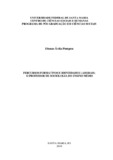| dc.creator | Pompeu, Dionas Ávila | |
| dc.date.accessioned | 2021-06-10T19:31:36Z | |
| dc.date.available | 2021-06-10T19:31:36Z | |
| dc.date.issued | 2019-08-23 | |
| dc.identifier.uri | http://repositorio.ufsm.br/handle/1/21107 | |
| dc.description.abstract | This dissertation is part of the research and debates concerning the link between work,
profession and education. The main objective of this study was to research, systematize and
present the educational trajectories and the working identities of the teachers who teach the
discipline of Sociology in the High School of the public-state schools of Santa Maria/RS.
Having Claude Dubar as the main reference in the question of professional and social identity,
which takes into consideration not only the subjectivities aspects of identity, but also the
macrostructures, that is, those external and somewhat coercive elements that influence the
conformation of individual self-identity, we sought to explore the current work configurations
of teachers of basic education in the state of Rio Grande do Sul, more specifically those who
were interviewed. To this end, it was used the application of questionnaires as well as interviews
and document analysis. At the structural theoretical level, there was a debate about the forms
of rationalization in the world of work - especially the more contemporary changes that
occurred after the 1970s - and their particularities in the school environment. Regarding the
professional aspect, we observed the forms of socialization through which individuals go
through and shape their identities. It was argued that teachers interviewed in their working
world experience aspects that have characteristics that approach and sometimes deviate from
the four identity configurations proposed by Dubar, namely, identity outside work, craft
identity, company identity and identity network. Moreover, observing the specific relationship
of these professionals with Sociology, it was possible to build three types of professional
identity related to the discipline: identity affiliation, identity affiliation and intermediary. | eng |
| dc.language | por | por |
| dc.publisher | Universidade Federal de Santa Maria | por |
| dc.rights | Attribution-NonCommercial-NoDerivatives 4.0 International | * |
| dc.rights.uri | http://creativecommons.org/licenses/by-nc-nd/4.0/ | * |
| dc.subject | Profissão docente | por |
| dc.subject | Identidade profissional | por |
| dc.subject | Sociologia no ensino médio | por |
| dc.subject | Racionalização do mundo laboral | por |
| dc.subject | Teaching profession | eng |
| dc.subject | Professional identity | eng |
| dc.subject | Sociology in high school | eng |
| dc.subject | Rationalization of the World of work | eng |
| dc.title | Percursos formativos e identidades laborais: o professor de sociologia do ensino médio | por |
| dc.title.alternative | Formative paths and labor identities: the high school sociology teacher | eng |
| dc.type | Dissertação | por |
| dc.description.resumo | Esta dissertação se insere nas pesquisas e nos debates referentes ao encadeamento entre
trabalho, profissão e educação. O principal objetivo deste estudo foi o de pesquisar, sistematizar
e apresentar as trajetórias formativas e as identidades laborais dos professores e das professoras
que ministram a disciplina de Sociologia no Ensino Médio das escolas público-estaduais da
cidade de Santa Maria/RS. Tendo em Claude Dubar a principal referência no quesito identidade
profissional e social, o qual leva em consideração não somente os aspectos subjetividades da
identidade, mas também os macroestruturais, ou seja, aqueles elementos externos e de certa
forma coercitivos que exercem influências para a conformação da auto-identidade do indivíduo,
procurou-se explorar as atuais configurações do trabalho dos docentes da educação básica do
estado do Rio Grande do Sul, mais especificamente daqueles que foram entrevistados. Para tal,
recorreu-se tanto a aplicação de questionários como a realização de entrevistas e análise
documental. No plano teórico estrutural, exercitou-se o debate sobre as formas de
racionalização no mundo do trabalho – sobretudo as mudanças mais contemporâneas que
ocorreram após os anos 1970 – e suas particularidades no ambiente escolar. No tocante ao
aspecto profissional, observou-se as formas de socialização pelos quais os indivíduos passam e
conformam suas identidades. Argumentou-se que os docentes entrevistados em seu mundo
laboral vivenciam aspectos e possuem características que se aproximam e por vezes se afastam
das quatro configurações identárias propostas por Dubar, a saber, identidade de fora do trabalho,
identidade de ofício, identidade de empresa e identidade de rede. Ademais, observando a
relação específica destes profissionais com a Sociologia, foi possível construir três tipos de
identidade profissional referentes a disciplina: a filiação identitária, a desfiliação identitária e a
intermediária. | por |
| dc.contributor.advisor1 | Ferreira, Laura Senna | |
| dc.contributor.advisor1Lattes | http://lattes.cnpq.br/5082040171132147 | por |
| dc.contributor.referee1 | Mayer, Ricardo | |
| dc.contributor.referee1Lattes | XXXXXXXXXXXXXXX | por |
| dc.contributor.referee2 | Mazon, Márcia da Silva | |
| dc.creator.Lattes | XXXXXXXXXXXXXXXX | por |
| dc.publisher.country | Brasil | por |
| dc.publisher.department | Sociologia | por |
| dc.publisher.initials | UFSM | por |
| dc.publisher.program | Programa de Pós-Graduação em Ciências Sociais | por |
| dc.subject.cnpq | CNPQ::CIENCIAS HUMANAS::SOCIOLOGIA | por |
| dc.publisher.unidade | Centro de Ciências Sociais e Humanas | por |



